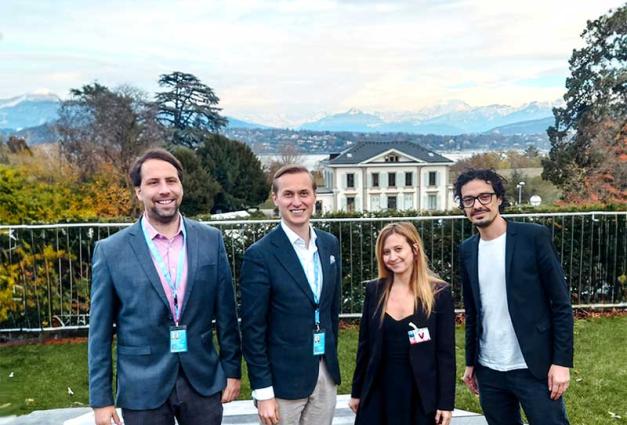Grad schools often discuss academia as a career path for personality and social psychologists, but there can be less conversation about the meaningful careers available in the private sector, government, and nonprofit industries. Here, three SPSP Early Career members with experience in postdocs or jobs in these fields share their advice for students who may be considering nontraditional career paths after graduation.
Ashley Angulo completed her PhD at UCLA in 2017 and worked as a postdoctoral researcher with the Behavioral Economics group of Disney Research’s Pittsburgh office. She is currently a postdoctoral research fellow in Carnegie Mellon’s Department of Social and Decision Sciences.
Samantha Neufeld graduated with a PhD in social psychology from Arizona State University in 2012 and completed a one-year postdoc at their Global Institute of Sustainability. She is now a senior design researcher with Microsoft AI+R (Artificial Intelligence and Research).
Ellie Shockley earned her PhD in social psychology from the University of Chicago in 2013 and then moved to a 2-year postdoc at the University of Nebraska Public Policy Center. She now works as an institutional research analyst for Bismarck State College, part of the North Dakota University System.
Tell us more about what you do day-to-day
Ashley: At Disney I conducted research akin to what I worked on in graduate school, but with a separate component that involved interfacing with business units in a consultant role. One project was with the resort hotels in Orlando. We developed a new way to test for privacy preferences. I really liked that I could keep one foot in academic research, but also try out consulting during the position.
Ellie: I am a state employee working for Bismarck State College which is a part of the North Dakota University System. I work on a variety of issues relating to students and, to an extent, workforce needs. I was recently appointed by our governor to a Task Force on Higher Education Governance, so I am also a public servant in the state executive branch.
Samantha: As a design researcher, I work with designers, developers, program managers, prototypers, and others on a variety of products and features in the AI space. My role is to investigate the user and the user experience, with specific goals of identifying existing pain points and market opportunities, brainstorming new ideas, refining the value proposition of a product, improving the usability, aesthetics, engagement, and customer satisfaction of a product, and assessing the user experience of competing products.
What led you to these roles or helped you in the hiring process?
Ashley: I knew a former Berkeley graduate student who had the position at Disney Research Pittsburgh before me. I also went on the website and looked at the behavioral research group and the work they were doing and emailed folks for a coffee meeting. I was lucky in this case as my graduate advisor was one degree of separation from one individual in particular, which probably helped.
Samantha: In grad school, my boyfriend founded a startup focused on energy conservation and home automation. He wanted to understand how to motivate people to conserve energy, and I started working with him on a series of projects applying behavioral science to energy conservation. Then the year before I graduated, I met a UX researcher from Google at SPSP. Talking with him helped me realize that the work I was doing at my boyfriend’s company could be a formalized tech career. I kept in touch with him, and he has been a wonderful resource on job information. I can’t stress enough the importance of networking. Most people are happy to help, and the importance of “who you know” continues to amaze me.
Can you talk a bit more about your experience during the job search?
Samantha: I started looking while finishing my postdoc. The academic job search is somewhat seasonal, with most jobs posted in the fall, but industry jobs are posted all year long. From the time I submitted my first industry application to the time I accepted the offer from Microsoft was probably about four months. However, the process for the Microsoft position was pretty fast. I submitted my CV through an internal referral (I had a friend working there) in late April, was interviewed by phone a few days later, had an in-person interview a few weeks after that, and they made me an offer within a couple of days.
Ashley: I applied pretty broadly in terms of location, position, department, and research focus. I interviewed for academic positions at Princeton and Penn, but did not secure an offer. The Disney process involved many steps. I flew out for a job talk in March and had an official offer by May.
What skills from graduate school have helped you be successful in your current role?
Ellie: My quantitative skills are extremely valuable in my work, and while the work I do is not especially theoretical, the kind of logical thinking involved in theoretical training is highly useful to my work. Much of the core content from my graduate school was political psychology, and that knowledge is of course very valuable in my situation!
Samantha: Understanding and implementing the research process. My role in product development is to identify and answer questions about the user and the user experience. After determining the important questions, I decide which research method(s) are most appropriate, design and run the study, analyze the data, identify actionable insights, and share them with stakeholders, who are often non-scientists. We don’t always formulate hypotheses before running a study and it isn’t always as rigorous as academic research, but the fast pace and need for quick feedback requires a solid understanding of the scientific method.
Some of you chose postdocs. Would you recommend one to current students?
Ellie: I am a big fan of postdocs. A lot of us don't exactly know what career we want long-term, and postdocs keep doors to traditional academia open for a bit while we continue to gain expertise that makes us better candidates for both traditional academia and other career paths where the skills of a social scientist are valuable. It is the best way to simultaneously pursue multiple potential career paths at once. Students might want to consider an institution that is different from one's doctoral-granting institution. I get there can be good reasons for staying at one’s graduate institution for a postdoc, but it can make one entrenched in working with certain types of people and within certain types of contexts with set norms.
Ashley: I always thought a postdoc would be a good fit as I wanted more time to develop ongoing projects and submit for publication before taking on teaching loads and departmental committee responsibilities.
Samantha: Maybe. If you want an industry job and the postdoc is just an extension of grad school that doesn’t get you more applied experience, then it may not be useful. But there are industry postdocs! I’m not sure how many are out there, but they would be a great segue from academia to industry.
What advice do you have for students looking for work in industry or non-profit?
Ashley: I think utilizing my network is the thing that helped me the most. Also, going to conferences, participating in forums, and letting go of the fear of cold-calling and cold-emailing helped me find the positions that were of interest to me and then benefit from one-on-one conversations later.
Samantha: Search job sites and talk to people, there are so many opportunities out there. I have friends who went into program evaluation careers at education nonprofits and government mental health programs, friends in statistical analysis roles at financial institutions and friends who went into grant writing. Also, short-term contract positions or summer internships can get you a foot in the door at a company, and help build industry experience.
Ellie: I definitely think that institutional research within higher education is a very good career path for many social and personality psychologists. More should consider it. I also think we have a lot to offer when it comes to public service/government. We're so well trained in handling competing theoretical ideas and in drawing sound conclusions from evidence. That stuff is important in government too!
Overall, what advice would you give current students or recent grads on pursuing a career outside of academia?
Samantha: Don’t close any doors to yourself. Just because you may be exploring industry does not mean you should put academic research aside. Also, practice running qualitative studies that inform your academic work to determine whether you enjoy that type of research. Find ways to work with others outside of psychology - you will learn a great deal about approaching research questions from other perspectives. Plenty of companies offer summer internships and nonprofits are always looking for volunteers. What these organizations want is people who understand the research process, and/or people who can apply the skills we’re taught (e.g., statistical analysis) in another setting.
Ellie: I'd like them to know that their skills and expertise are incredibly valuable. The academy can do a good job of making some people never feel good enough. In reality, the world needs sharp thinkers and numerate people -- and badly. Social and personality psychologists have so much to offer in so many lines of work. It really is OK if traditional academia doesn't work out. You can still have an incredibly meaningful career where you use your skills every day.




